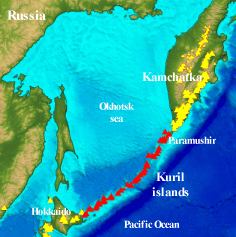Europe forces Russia to give away Kurile Islands to Japan
Russia is not going to stay indifferent to the fact that “certain politicians continue poisoning the political climate on the continent

The European Parliament has slapped Russia in the face again. The chairman of the committee for international affairs of the State Duma, Konstantin Kosachev, said that European deputies passed a special resolution on July 7th, which contained an appeal to the Russian administration to return so-called northern territories of the Far East to Japan. According to the document, the Soviet Union “occupied” the territories at the end of WWII, and they still remain under Russia's “occupation.”
The USA has already attempted to interfere in the bilateral Russian-Japanese dispute regarding the Kurile Islands. The head of the Pentagon, Donald Rumsfeld, stated in December of the past year that the US administration could understand Japan's standpoint on the four of the moot questions of the conflict. The US Defense Secretary added that Washington would raise the problem of the Kurile Islands during US-Russian talks, when an adequate opportunity could occurr. 
The European Parliament presented its view of the matter as well: the parliament is trying to stand for Japan, in spite of the fact that Japan is not one of its members. One shall assume that the European parliament would be a lot more inspired to support territorial claims of the Baltic states against Russia too.
It is noteworthy that Japan, Latvia and Estonia are not the only states in the world that wish to get hold of a piece of the Russian territory. Russia has recently had to give away a part of the border territory to China – other countries may wish to repeat China's success and get in the line for the Russian territory too. Finland dreams to retrieve the Karelian Isthmus; Poland, Romania and Norway have something to ask about too. These states have not formulated their claims on an official level, yet, but they can be heard from political leaders of nationalist organizations.
If the international community shares an opinion that Russia needs to be divided and distributed between its neighbors, the world's largest country will have to experience tough times.
Konstantin Kosachev could hardly conceal his indignation, commenting on the above-mentioned resolution of the European Parliament. According to the Russian official, the support of Japan's revisionist requirements looks absurd in the context of the problem. “Any external pressure in such problems can never strengthen the regional security,” Kosachev said. The Russian parliamentarian pointed out that the geography of “European adjustors of history” had considerably extended recently. “It is does not matter for the European Parliament, where the claims come from. It does matter for them, though, that they are being proposed against Russia,” Kosachev said.
The head of the State Duma committee for international affairs stated at the end of his speech that Russia was not going to stay indifferent to the fact that “certain politicians continue poisoning the political climate on the continent, offering their recommendations to solve the problems, which they have nothing in common with.”
However, Russia does not have any levers of influence on the matter: the Russian administration will simply have to watch its neighbors setting forth territorial claims. Andrey Ryabov, an expert with the Gorbachev Fund, stated that Russia should not take any measures in return to the attack from the European Parliament. “The resolution approved by the European Parliament does not have any political or legal effect. It is all about moral pressure. Russia's relations with the European Parliament started worsening after the period of the orange revolution in Ukraine. There is seemingly no aspiration to change anything for the better. The tendency could probably be explained with the fact that East European, Baltic and other Russia-unfriendly officials became members of the parliament. The European Parliament has been a rather problematic institution before. The policies of the parliament indirectly increase isolationist forces inside Russia too,” Andrey Ryabov concluded.
EU residents are little interested in the activities of the European Parliament, recent opinion polls in Europe showed. “Elections to the European Parliament take place at rather low turnouts. To a certain extent, the parliament reflects the public opinion of Europe and the positions of civil and human rights organizations. However, it does not mirror the opinions of European governments, who prefer to base their views on real politics, in which Russia acts as a full-fledged partner. European parliamentarians dislike present-day Russia, although they cannot be referred to as Russophobes. We need to choose: if we want to remain the central platform between the West and China, we may not show any reaction to those claims. However, if we want to integrate in Europe, we will have to revise our standpoint entirely,” Andrey Ryabov said.
Subscribe to Pravda.Ru Telegram channel, Facebook, RSS!


